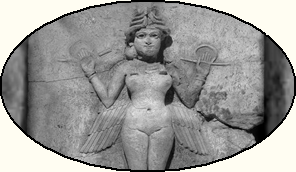Spadina Literary Review — edition 11 page 13
.../
Even as she mated ritually with kings and even as she waited for customers in the shadows of the temple walls, at the very same time (all things being simultaneous in mythological time) Inanna had one single great passionate love-of-her-life: Dumuzi, a.k.a. the “wild bull of heaven,” a herder-god from the edge of civilization. The following is from Kim Echlin’s translation of the intimate poem entitled “Oath of Woman.” Inanna is speaking to Dumuzi. The Sumerian word galla means vulva:
Place your right hand
on my galla
put your left hand
under my head
bring your mouth close to my mouth
take my lips in your mouth
When you do this
you make an oath to me
Echlin chooses the word galla “because such English equivalents as ‘genitals’ and ‘privates’ do not convey the Sumerian exuberance and delight in female sexuality.” When it comes to terminology for sexual parts, modern English is stuck with either antiseptic Latinisms or the basic Anglo-Saxon words which, as used in public, have become coarse shockers. It’s almost like we're due to import new words. It’s a safe bet the Sumerians didn’t share our psycho-linguistic hang-ups.

Inanna: most popular goddess in Mesopotamia
What I didn't find especially helpful were those parts of Echlin's commentary that strain to have Inanna conform to some notion of modern independent self-assured womanhood. For example Echlin tells us that Inanna, being committed to sensuality rather than fidelity, is not the type who would pin Dumuzi down in a relationship. Sorry to disagree, but in “Oath of Woman” Inanna does demand of Dumuzi that “you will swear that you will not touch another.” That sounds like age-old possessiveness to me. Moreover — I’ve been holding off mentioning this — if you recall Inanna's trip to the underworld, the only way she could return to the realm of the living was by designating a substitute to replace her in the realm of death. Now, when she discovered that Dumuzi had not been mournful in her absence, she turned treacherous toward him and designated him as her substitute. To care that much about being missed, it seems to me, is not a sign of independence.
The thing is, deities are not coherent personalities. They are no more than bundles of stories, and fan-fiction at that — anyone could make up anything as long as it was at least loosely related to what had been made up before.